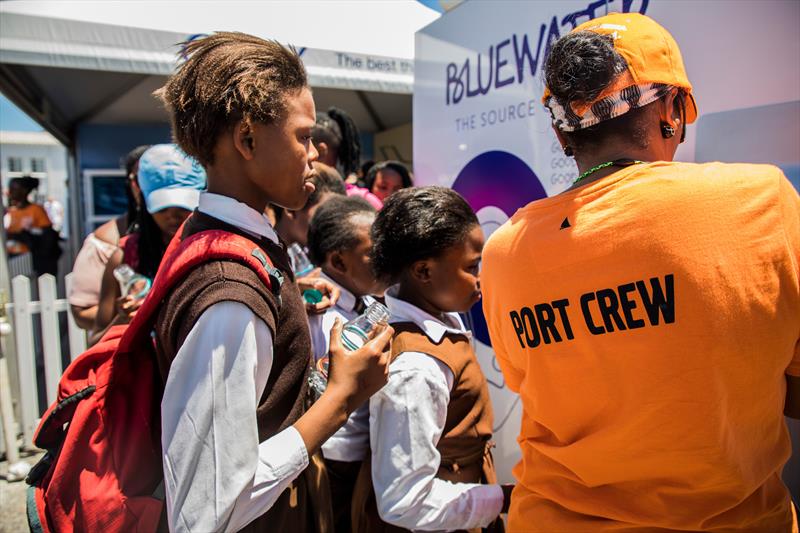
Technology helps Volvo Ocean Race save water and cut plastic in Cape Town
by Volvo Ocean Race 28 Nov 2017 19:55 GMT
28 November 2017

School children visit the Cape Town Volvo Ocean Race Village © Jen Edney / Volvo Ocean Race
Around half a million single-use plastic bottles will be avoided during the Volvo Ocean Race's Cape Town stopover thanks to an innovative new water purification solution which turns polluted and waste water into clean drinking water.
The technology, from Bluewater, has been provided in partnership with the Race's Founding Sustainability Partner, 11th Hour Racing, and with the support of the Cape Town City authorities, Host City delivery partner Worldsport and the V&A Waterfront.
The Cape Town stopover marks the eleventh edition that the Volvo Ocean Race has visited the South African city in the event's 44-year history – but with the city's water reserves currently low due to ongoing drought conditions, the 2017-18 stopover brought added challenges.
Bluewater's purified water solution means that the Race can generate up to 32,000 litres of clean drinking water for Race Village visitors daily throughout the Cape Town stopover, which runs until 10 December, without touching a single drop of municipal water.
Volvo Ocean Race's Sustainability Programme Manager Meegan Jones said: "These innovative water refill points in our Cape Town Race Village take our sustainable event management to new heights".
"We have a commitment to drastically reduce single-use plastics at all our stopovers, and the Bluewater refill points means we won't impact the City of Cape Town water reserves while still meeting our plastic reduction goals."
She continued: "In addition, we are running a hugely-successful plastic bottle exchange in partnership with Consol Glass, which allows Volvo Ocean Race Village visitors to swap a single-use plastic bottle for a stylish refillable glass bottle."
"It's a world-leading example of sustainable event management that we are very proud of and thankful to Bluewater, 11th Hour Racing, Consol Glass, WorldSport and the V&A Waterfront for helping us to make this happen."
At least one of the machines, which each generate up to 8,000 litres of clean drinking water daily, will be donated to the city of Cape Town at the end of the Volvo Ocean Race stopover.
11th Hour Racing, an organisation promoting collaborative, systemic change for the health of the marine environment, is a founding partner of the Race's Sustainability Programme.
"We are proud to join forces with Bluewater on this important project in Cape Town," said Jeremy Pochman, 11th Hour Racing Co-Founder and Strategic Director.
"This offers a great opportunity to work with the local community, event stakeholders and innovators to find solutions to a very serious environmental issue."
He added: "Together with Bluewater we can also amplify the awareness of people globally about the threats to local ecosystems and the efforts needed to address them."
Bluewater, a partner of 2017-18 racing team Vestas 11th Hour Racing, was founded by environmental entrepreneur Bengt Rittri, who also founded leading air purification company Blueair, which was recently acquired by Unilever.
"Bluewater stepped in to help the city and its citizens after learning that Cape Town's water reservoirs are at critical lows due to the drought conditions," said Anders Jacobson, CEO and co-founder of Blue AB, the Swedish holding company that owns Bluewater.
"Our partnership with 11th Hour Racing and Volvo Ocean Race provides us with an incredible opportunity to highlight Bluewater's mission to provide clean drinking water to people everywhere and how our technology can make it more available for millions of consumers around the world."
The Volvo Ocean Race's renewed sustainability focus in 2017-18 consists three key pillars: to maximise impact, to minimise footprint and to leave a positive legacy.
The provision of these innovative refillable water solutions is one part of a wide-ranging programme which includes a Sustainability Education Programme, welcoming kids from local schools to learn more about ocean health; a Science Programme generating ground-breaking research for scientists all over the globe, and a host of interactive and immersive sustainability activations in the Race Villages around the world.
In addition, the Cape Town stopover will host a two-day Ocean Summit on 7-8 December, to drive collaborative conversation and awareness of Ocean Health and plastic pollution issues amongst leaders and decision–makers from business, politics, science, environmental and sporting sectors.